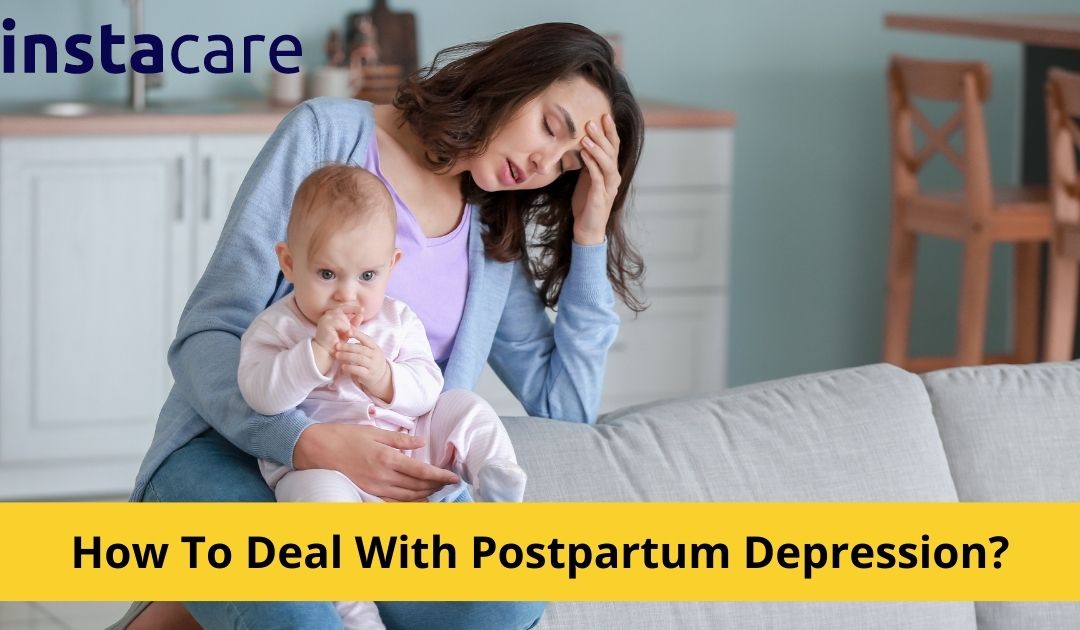The period after you have your baby is when there are many emotional fluctuations. There are mixed feelings of happiness, sorrow, joy, and fear, and if these mood swings become severe and start interfering in your daily life, then it means you are suffering from postpartum depression.
Postpartum depression can make you feel empty and emotionless leading to exhaustion. This problem should not be taken quickly. This disorder is severe, and various treatment programs can treat it. These feelings postpartum are valid, and these are not your fault from any side.
The symptoms start after some weeks of delivery, and this can cause trouble bonding with the baby. So you should treat it and visit your physician or doctor regularly. There are things you can do when experiencing depression and mood changes.
Symptoms Of Postpartum Depression
After the delivery, many women face some mood changes. They feel empty, moody, or tired, but their increasing symptoms will affect your daily life if it lasts for a longer time. These symptoms vary from person to person, and their biggest flaw is they will make you unconnected to your baby. Some common symptoms of postpartum depression are;
- Feeling overwhelmed
- Not having any interest in your infant
- Disturbance of sleep, sleeping too much or too little
- No motivation and energy
These emotions make you feel bad parents, but it is not correct. You should immediately consult with your doctor if you feel these symptoms.
How Can You Cope With Postpartum Depression
Your body goes through a lot of changes during pregnancy. There are many complications. If you feel some mood changes and anxiety during pregnancy or after delivery, then ask for help, but there are some things that you can do at home to prevent or cope with this issue that might be helpful to you.
View More: Premenstrual Dysphoric Disorder Symptoms Causes Treatment
Maintain Your Diet Healthy
Eating a healthier meal will not cure your PPD, but if you develop a habit of healthy eating, then you can fulfill all the necessary nutrients that will make you feel better. You can try making a diet chart and following it thoroughly, including all the vegetables, fruits, meat, etc.
Keep your body fit and do exercise when you can. According to the research, some antidepressant effects for women suffering from PPD. Try inhaling fresh air and taking strolls early in the morning as it is considered the way that relieves depression.
Try Building A Strong Bond With Your Baby
As the main reason for the depression and discomfort is your baby, try making a closer bond with your baby. A complete emotional bonding will not only help you overcome the depression but allow the child to feel free and develop fast.
Postpartum depression can be cured by bonding between your child and you. If you are not getting well with your baby, it will make it difficult for you to take care of yourself and your baby.
Give Yourself Time To Rest
When the baby sleeps, the saying that sleep may not sound true, but it is scientifically proved that the women who do not take enough sleep are most likely to experience depression. Your baby is not expected to sleep through the night in the early days. That may be easy for you to take a nap and go to bed.
If you will not take care of yourself and disturb your sleep cycle, this may have a terrible effect on your health.
Breast-Feeding Baby
Breastfeeding might decrease your risk of postpartum depression, and you can easily continue it for the first four months. This will help reduce your stress, and if you are enjoying the process, you can keep at it.
View More: What is obesity and how it affect women's health
But there are some cases when women suffer from depression and mood swings while breastfeeding. This condition is referred to as Dysmorphic Milk Ejection Reflex, in which there is a sudden feeling of sadness and anger. Hence you should choose a suitable method of feeding.
Medications For PPD
To avoid this condition, some antidepressants will relieve your symptoms, but you need to check by yourself which medicine is working well:
Atypical Antidepressants: these pills target the neurotransmitters in the brain that control mood swings and help treat depression like trazodone, nefazodone, etc.
Brexonolone: is the medicine that doctors recommend when the patient doesn't respond to other treatments.
Conclusion
Postpartum depression can be maintained by taking some measures. You can attend yoga classes to keep your mind calm and try to make more and more closer bond with your baby.
Please book an appointment with the Best Doctors For Postpartum Depression in Lahore, Karachi, Islamabad, and all major cities of Pakistan through InstaCare, or call our helpline at 03100002273 to find the verified doctor for your disease.









